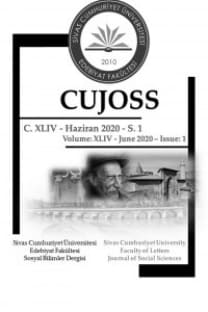Eşitsizlikler, Kalkınma Sorunları ve Terör
ABD'ye yönelik 11-Eylül saldırısından sonra, terör hareketleri ve terörün doğası yeniden tartışılmaya başlandı. Terörün sadece tek bir ulusu tehdit etme özelliğinin kaybolduğu, bunun yerine küresel terör denebilecek bir tür terörün aldığı dile getirilmektedir. Bu terör türünün tarihte gözlemlenen terör türlerinden farklı olduğu ve farklı önlemler alınması gerektiği fikri yaygınlaşmaktadır. Diğer yandan, bu terör türü ile mücadele etmenin bir yolunun ekonomik iyileştirmelerden geçtiği, Birleşmiş Milletler başta olmak üzere, çeşitli uluslararası kuruluşlarca ifade edilmektedir. Ancak, ülkelerin yoksulluklarını ve azgelişmişliklerini öne çıkaran böyle bir yaklaşım doğru mudur? Terörün gerçek kaynağı, yoksulluk mu yoksa kökü çok daha derinlerde olan eşitsizlikler midir? Bu çalışma, temel olarak, terörün siyasi ve tarihsel olaylardan kaynaklandığını, ancak eşitsizlikler ortamında çok daha ileri düzeylere taşınarak boyut değiştirdiğini ileri sürmektedir.
Inequalities, Some Problems in the Process of Development and Terror
Following 11-Sep attack targeted at. WTO, the concept of terror is brought back into scientific and intellectual agenda of both Western and Eastern countries which were mostly Islamic and ruled by Islamic rules. It is now much more discussed that the conventional direction of terrorism has been shifted from nationalistic scale towards global one. This is called global terrorism different from all of its similar forms observed through history of civilisation and therefore unusual precautions must be launched in all countries which are under the attacks of this kind of terrorism. For this reason, recently developed political approaches called pre-emptive measures strike have emerged as a new interpretation of national security, especially in USA. In this line, US admiration has also defended the idea that the main source oj the terrorism is the widespread poverty and undeveloped economical conditions prevailed for long time in some countries. This is also backed by international organisation such as US'. However, there is no doubt that this approach is open to further questioning from the point oj view of the countries accused of being the motherland oj terrorism. Can the poverty' be seen as actual source of terrorism or to be more realistic, is it somewhere deep down history and politics? This paper argues with the idea that terror is mainly related to history and politics rather than economic, beside this, terror movements are fed and powered by inequalities created and boosted by capitalism. Under capitalist market conditions, terror changes its dimension and becomes global one.
___
- ATKINSON, Anthony B. (1999), "İs Rising Inequality Inevitable? A Critique of Transatlantic Consensus", United Nations University: WİDER Annual Lectures 3.
- BAIROCH, Paul. (2000), "The Constituent Economic Principles of Globalisation in Historical Perspective: Myths and Realities", International Sociology, Vol: 15, No:2, p: 197-225.
- BELEK, İlker. (1998), Sınıf Sağlık, Eşitsizlik, İstanbul: Sorun Yayınları.
- BM, 56. Genel Kurul Toplantısı (16/11/2001), http://www.un.org/terrorism/statements/slovakiaE.html http://www.un.org/webcast/ga/56/statements/,
- CIVELEK, Mehmet. (2001), Küreselleşme ve Terör, Ankara:Ütopya
- GALBRAITH, James K. (2002a), "Inequality and Globalization: Ideology, Fact, and the Ethical Dimension", A lecture at EPIIC, Tufts University.
- GALBRAITH, James K. (2002b), "Is Inequality Decreasing?", Foreign Affairs; Jul/Aug2002, Vol. 81 Issue 4, pi 78, 2p.
- GINDIN, Sam, (2002), "Challenging Globalization". Canadian Dimension, Vol. 36 Issue 4, pi 8, 5p.
- HURRELL. A (2001), Global Inequality and International Institutions and World Politics, Oxford: Oxford University Press.
- JUHASZ, Antonia. (2001), "Globalisation of Poverty", Tikkun, Vol: 16, No:6, p:20-22.
- KRUEGER. Alan.B. and Jitka Maleckova (2002), "Does Poverty Cause Terrorism?", New Republic, Vol:226, No:24, p:27-34.
- KRUEGER. Alan.B. and Jitka Maleckova (2003), "Seeking the Roots of Terrorism", Chronicle of Higher Education Vol: 49, No:39.
- PIETERSE, Jan Nedeerveen. (2002), "Global Inequality: bringing politics back in", Third World Quarterly, Vol:23, No.6, pp 1023-1046.
- UN, (2001), Report on the World Social Situation.
- UN, (2002), Human Development Report.
- UNİCEF, (2001), Statistics.
- WHO, (2002), the World Health Report.
- ISSN: 1305-5143
- Yayın Aralığı: Yılda 2 Sayı
- Yayıncı: Sivas Cumhuriyet Üniversitesi Edebiyat Fakültesi
Sayıdaki Diğer Makaleler
Eşitsizlikler, Kalkınma Sorunları ve Terör
Sosyal Zeka Kavramının Bir Boyutu Olarak Empati ve Performans Üzerine Bir İnceleme
Abdullah TANRISEVDİ, Murat HANÇER
XIX. Yüzyılın Başlarında Tokat Voyvodalığı'na Bağlı Bazı Türkmen Kabilelerinin Sorunları
Devrimci Hugo mu İnsancı Hugo mu?
Tanzimat Döneminde Tokat Kazasının İdari ve Nüfus Yapısındaki Değişiklikler (1839-1880)
